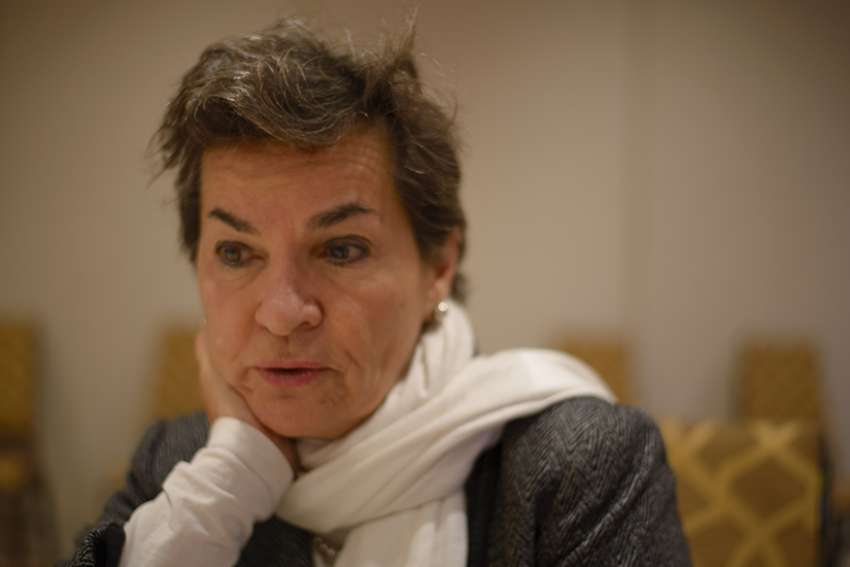Christiana Figueres, former executive secretary of the UN Framework Convention on Climate Change. “Church institution divestments are very important. They don’t add up to trillions, but they have a very important exemplary role," Figueres said.
Photo by Michael Swan
Moral leadership of 'Laudato Si' becoming more evident
By Michael Swan, The Catholic Register
As more than 40 Catholic institutions announced they would no longer invest in fossil fuel companies, a former United Nations chief climate negotiator said the Pope’s environmental vision laid out in Laudato Si’ is becoming even more relevant.
“There’s always a need for moral leadership,” said Christiana Figueres. “If anything I think the need and the urgency for moral leadership has actually increased.”
Figueres is the former executive secretary of the United Nations Framework Convention on Climate Change. She was responsible for getting the world’s countries to sign the December 2015 Paris climate accord — a key goal of Pope Francis when Laudato Si’ was released.
“I’m not Catholic, but I think the huge value-add of the Pope is that he — obviously, he’s the head of the Catholic Church — but he also uses his moral voice, which goes above any religion. He speaks directly to that moral responsibility we all have as human beings,” said the Costa Rican diplomat.
Figueres was in Toronto just days after the “Season of Creation,” a month-long movement to pray and care for the environment endorsed by Pope Francis, came to a conclusion on the feast of St. Francis with the largest-ever Catholic divestment announcement in St. Francis’ hometown of Assisi.
The 40 institutions pulled their money out of climate-warming entities in response to Pope Francis’ call in Laudato Si’ to be proactive to protect the environment and make investments that promote a carbon-neutral environment.
“Church institution divestments are very important,” Figueres said. “They don’t add up to trillions, but they have a very important exemplary role. They take moral responsibility to the next level. You can’t have moral responsibility that is just abstract. There has to be a consequence to that moral responsibility.”
Figueres gave a speech to the Canadian Council for Public-Private Partnerships about the need for new, more robust infrastructure to withstand more frequent and violent hurricanes, tornadoes and other effects of climate change. She swept into Toronto in the wake of four massive hurricanes which displaced 100,000 people and caused $400 billion in damage in the United States alone.
“All of this is actually interrelated and it all ends up in incredible suffering for which we will never have a number,” Figueres told her audience of bankers, engineers and insurance executives. “It’s irrelevant if you believe in climate change, just as it is irrelevant whether you believe in gravity.”
Redirecting investment away from carbon and toward sustainable energy and infrastructure will be key to actually meeting the Paris accord goals, including net year-over-year declines in greenhouse gases, she said.
“By 2020 we need to completely reverse the trajectory of greenhouse gases. We need to be looking at a curve that goes down,” she said.
While China makes massive investments in solar, wind and nuclear power, Western countries, including Canada, are subsidizing fossil fuel exploration and delivery to the tune of $5.3 trillion per year — six per cent of global GDP — said Figueres. Canada is part of a 35-nation group at the United Nations looking for co-ordinated ways to cut fossil fuel subsidies.
“We as humanity, we have to know we are facing a crossroads… Sometimes we just have to stand up to reality,” Figueres said.
The moral argument about climate change is not about abstract, academic theorizing, said Figueres. This year’s hurricane season in the Caribbean is only a small taste of what will happen if the carbon content in the Earth’s atmosphere does not decline, she said.
“The physical impacts of climate change would be so frequent and so intense that the most vulnerable populations would have to be in reconstruction mode constantly” she said. “They would not be able to attend to anything else other than just basic reconstruction.”
Please support The Catholic Register
Unlike many media companies, The Catholic Register has never charged readers for access to the news and information on our website. We want to keep our award-winning journalism as widely available as possible. But we need your help.
For more than 125 years, The Register has been a trusted source of faith-based journalism. By making even a small donation you help ensure our future as an important voice in the Catholic Church. If you support the mission of Catholic journalism, please donate today. Thank you.
DONATE

